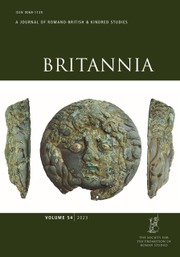No CrossRef data available.
Article contents
Potters or Cooks? Changes in the Later Iron Age/Early Romano-British Ceramic Industry at Silchester
Published online by Cambridge University Press: 17 August 2022
Abstract
A recent paper in Britannia explored some of the potential factors which might have led to potters in the Silchester area continuing the production of flint-tempered pottery, already established in the Iron Age, into the start of the Roman period. This paper attempts to expand the discussion by considering the viewpoint of the potters’ customers and what they might have been looking for when purchasing their pots, with particular emphasis on the characteristics required of cookwares.
- Type
- Shorter Contributions
- Information
- Copyright
- Copyright © The Author(s), 2022. Published by Cambridge University Press on behalf of The Society for the Promotion of Roman Studies


